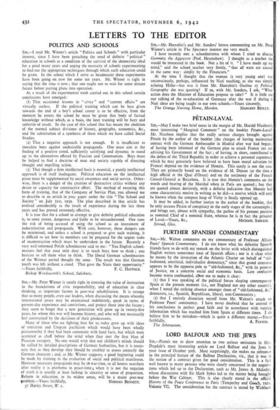SIR, —Mr. Peter Wiener is surely right in stressing the value
of instruction in the foundations of civic responsibility, and of education in clear thinking, as important factors in post-war rehabilitation. It is strange that so many people, even our leaders, when discussing the means whereby international peace may be .rnaintained indefinitely, speak in terms of present-day experience and convictions, and project these into the future ; they seem to forget that a new generation will grow up in twenty-five years, kid whom this war will become history, and who will not necessarily feel constrained by the decisions of their predecessors.
Many of those who are fighting best for us today grew up with ideas of toleration and Utopian pacificism which would have been wholly praiseworthy if they had been consonant with hard facts, but which were scattered as chaff before the wind when they met the first blast of Prussian savagery. No one would wish that our children's minds should be sullied by detailed descriptions of German barbarities, but it is neces- sary that as they develop they %hould be enabled to assess correctly the German character ; and, as Mr. Wiener suggests, a good beginning could be made by training in the evaluation of social and political manifestos. However necessary propaganda may be in war-time, to all honest searchers after reality it is anathema in peace-time when it is not the negation of truth it is usually at least lacking in sincerity or sense of proportion. Reform in education, in its widest sense, will be a major post-war


























 Previous page
Previous page